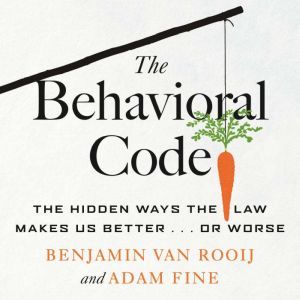

The Behavioral Code
The Hidden Ways the Law Makes Us Better . or Worse
Author: Benjamin van Rooij, Adam Fine
Narrator: Danny Hughes
Unabridged: 9 hr 13 min
Format: Digital Audiobook Download
Publisher: Beacon Press Audio
Published: 10/26/2021
Categories: Nonfiction, Political Science, Public Policy, Psychology
Synopsis
A 2022 PROSE Award finalist in Legal Studies and Criminology
A 2022 American Bar Association Silver Gavel Award Finalist
A Behavioral Scientist’s Notable Book of 2021
Freakonomics for the law—how applying behavioral science to the law can fundamentally change and explain misbehavior
Why do most Americans wear seatbelts but continue to speed even though speeding fines are higher? Why could park rangers reduce theft by removing “no stealing” signs? Why was a man who stole 3 golf clubs sentenced to 25 years in prison?
Some laws radically change behavior whereas others are consistently ignored and routinely broken. And yet we keep relying on harsh punishment against crime despite its continued failure.
Professors Benjamin van Rooij and Adam Fine draw on decades of research to uncover the behavioral code: the root causes and hidden forces that drive human behavior and our responses to society’s laws. In doing so, they present the first accessible analysis of behavioral jurisprudence, which will fundamentally alter how we understand the connection between law and human behavior.
The Behavioral Code offers a necessary and different approach to battling crime and injustice that is based in understanding the science of human misconduct—rather than relying on our instinctual drive to punish as a way to shape behavior. The book reveals the behavioral code’s hidden role through illustrative examples like:
• The illusion of the US’s beloved tax refund
• German walls that “pee back” at public urinators
• The $1,000 monthly “good behavior” reward that reduced gun violence
• Uber’s backdoor “Greyball” app that helped the company evade Seattle’s taxi regulators
• A $2.3 billion legal settlement against Pfizer that revealed how whistleblower protections fail to reduce corporate malfeasance
• A toxic organizational culture playing a core role in Volkswagen’s emissions cheating scandal
• How Peter Thiel helped Hulk Hogan sue Gawker into oblivion
Revelatory and counterintuitive, The Behavioral Code catalyzes the conversation about how the law can effectively improve human conduct and respond to some of our most pressing issues today, from police misconduct to corporate malfeasance.

